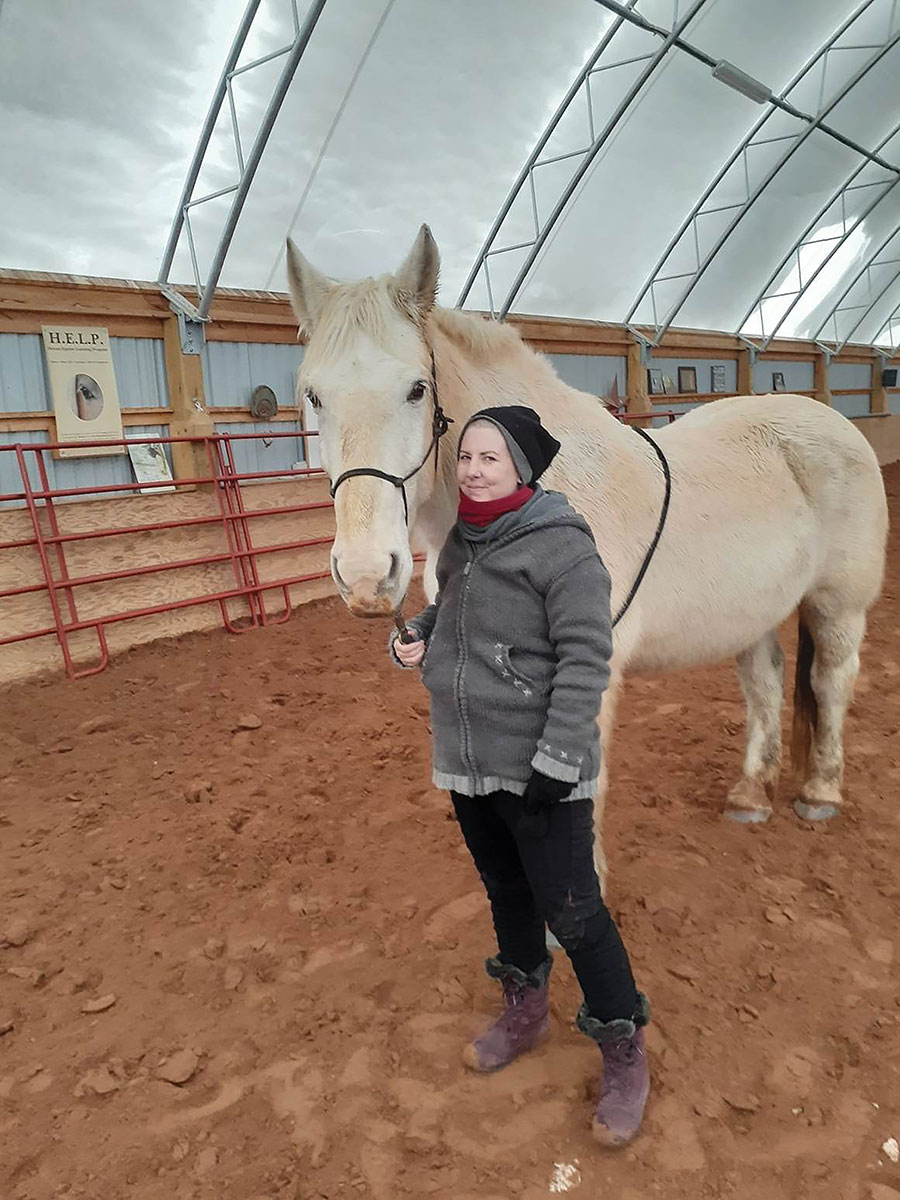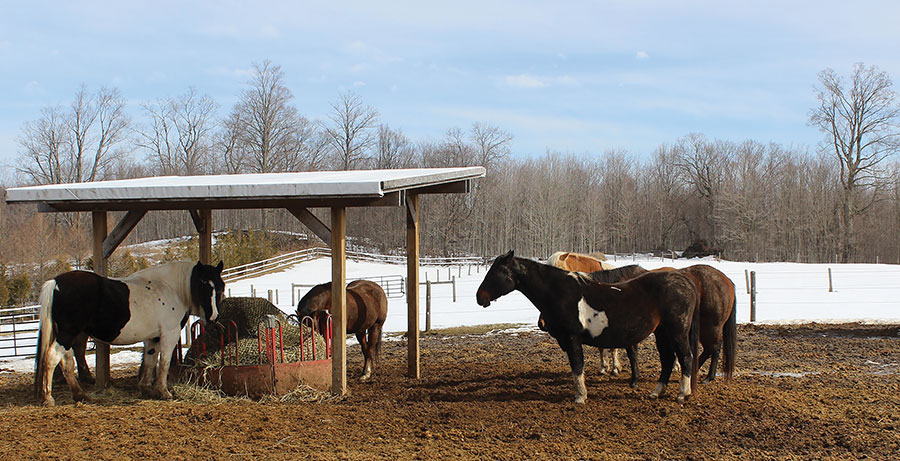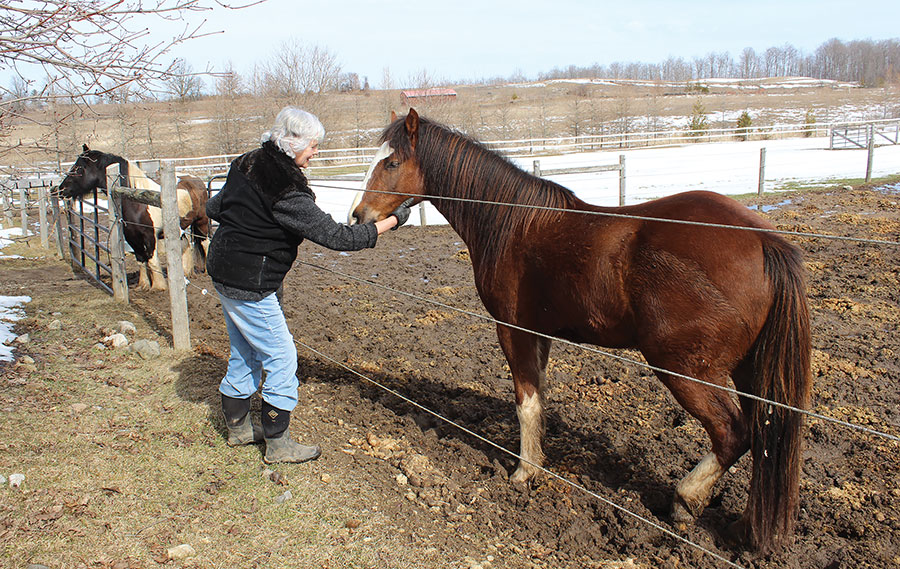ROCKWOOD – At the end of each session she was smiling, and months later she’s still benefitting.
That’s what Lisa Russell said of the equine assisted learning (EAL) program at Sierra Acres.
Five minutes southeast of downtown Rockwood, Sierra Acres Equine Assisted Learning supports people with personal development, mental health and corporate team building.
Anne Porteous, founder and CEO of Sierra Acres, said EAL revolves around relationships between horses and humans and helps people “explore what’s going on inside of them.”
Porteous is certified with the Equine Assisted Growth and Learning Association (EAGALA). She’s also a nursing professor with over 40 years experience in nursing and a trauma-informed counsellor who has facilitated EAL for over a decade.
In addition to her work at Sierra Acres, Porteous supports first responders with post traumatic stress disorder (PTSD) at The Stable Grounds residential facility in Rodney.
“All the years I’ve done this it still amazes me; horses so non-judgmentally just show us what we need to start addressing,” Porteous said in an interview with the Advertiser.
Areas of focus
EAL helps with communication, confidence, boundaries, resilience and problem solving, Porteous said.
Russell went to Sierra Acres primarily because of her PTSD.
“Medications and the current medical world was not alleviating any of my issues,” she said in an interview.
Russell said her diagnoses include treatment resistant depression, generalized anxiety and borderline personality disorder, but PTSD is the central concern.
Her goals at Sierra Acres included decreasing depression and anxiety and increasing self-confidence, gratitude, hope, and comfort in her own skin.
Russell rode horses in her youth, but previous experience with horses is not needed for EAL and sessions at Sierra Acres do not involve riding – participants work with the horses from the ground.

‘Smiling’ – Lisa Russell stands with Molly during an equine assisted learning session at Sierra Acres. Submitted photo
Learning from horses
“Horses have evolved over 43 million years,” Porteous said, and during this time “they’ve learned to manage.”
She describes the animals as “masters of the moment,” noting when something scares a horse, their instinct is to run away, and then return promptly to what they were already doing (usually eating).
They don’t spend time “ruminating,” or worrying whether that predator will come back, Porteous said.
Russell remembers noticing this at the end of her first session, when she went out to the paddock to meet the “team.
“Two horses got into a little tiff,” Russell recalls, and one of them walked away, went to the water trough, took a drink, and then returned to the hay bale in the center of the herd.
“He took some time, separated himself from the situation, and then went back when he felt stable,” Russell said, noting that sets an example of how people can respond to stressful situations.
There are seven horses in the program: mares and geldings of different breeds, sizes, and ages, Porteous said.
“Each horse brings a different quality and strength,” she said, and she usually asks her clients to pick the horse they feel most drawn to.
Russell chose Molly and Zena, and describes Molly as caring, calm, compassionate and chill, while “Zena had a more strong and confident presence,” and was motherly and courageous.
Porteous and Russell note how “intuitive” horses are, and Porteous adds “you can’t lie to a horse.”
Porteous said horses “help us to see areas we can work on to improve ourselves,” and can teach people “how to be more authentic, more our own true self.”
She said since the COVID-19 pandemic many of her clients feel lost and lack a sense of identity and connection to the world.
Russell noted she was “not really feeling able to connect with people.”
“Being with the horses can help with that,” Porteous said.
EAL helps people “start taking off some of the layers that have built up over the years that don’t serve a purpose anymore,” she added.
When someone is interested in signing up, Porteous begins by meeting with them for a “discovery session.”
This involves Porteous and the client gauging if they’re a good fit. If they are, Porteous creates a customized program to meet their needs.
Before her first session, Russell felt nervous, but she sat down with Porteous in the arena – just the two of them, without any horses.
She said Porteous is “easy going and leveled,” and “asked why I thought this might be something that could change something for me,” adding “obviously traditional medicine hasn’t really worked.”

Porteous’ team of horses spend most of their time relaxing in their paddock at Sierra Acres in Rockwood. Photo by Robin George
Matching energy
Russell said during the sessions she felt “really contemplative” and tried to absorb as much as possible.
Sessions involved “little exercises,” she said, like leading the horse around the arena.
She said if the horse didn’t initially walk with her she would pause, take a deep breath, square her shoulders, and try again.
Russell said Porteous taught her to mirror the horse’s energy and pace.
“In order for the horse to connect with you and for you to connect with the horse, you need to be able to match their energy,” she added.
“It’s so intense.”
Russell said mirroring the horse’s energy helped her feel “determined, confident, and calm.”
Porteous said some new clients have a fear of the horses in the beginning, “but it’s a wonderful moment when people realize they can learn how to overcome their fear.”
They can then take what they learn from facing that fear and use it out in the world, she added.
Porteous said “participation in any activities with the horses is by invitation – it’s okay to say ‘no’ or I’’m not comfortable doing that,’” and she works “with the client to engage to the best of their ability in that moment.”
The ‘best day’
Russell frequently reminisces about her “best day” at Sierra Acres.
“I was walking with Zena and Molly,” Russell said, “huge draft horses on either side of me” and after looping the lead ropes over their backs, she “just let go.”
Russell kept walking, and to her amazement the horses did too.
“I didn’t even have to touch them,” she exclaimed. “That was just incredible, feeling a horse follow you. You’ve connected with the horse and now you are working together. That’s when the confidence really comes in.
“I had the biggest smile.”
Now, when Russell wants to boost her mood or lift her confidence, she shuts her eyes and remembers that moment, “and it puts a smile on my face.”
She said the sessions made her feel “more aware that I do have some power to manage my diagnosis.”
Funding
Porteous said EAL is “not recognized in most insurances,” so the majority of her clients pay out of pocket. She notes occasionally Children’s Aid and Victim’s Services will sponsor the sessions.
Russell said Ontario Disability Support Program (ODSP) did cover the transportation costs for her to take a cab to and from Sierra Acres (she lives in Guelph).
“I feel really grateful for that experience, even though it came out of my own pocket, it was definitely worth it,” Russell said.
Long-term impact
Porteous said after completing the program her clients report increased confidence, a better understanding of themselves, a higher level of awareness, and they’re more responsive instead of reactive.
“It’s kind of amazing,” Russell said, that horses can contribute to treating “horrible mental illnesses.
“Every time I left I was smiling,” she said, in spite of always feeling depressed when she showed up.” She said she’s “still learning from it,” even though her sessions finished at the end of January.
Since the EAL program Russell has been journalling every morning and evening, practicing mindfulness exercises she learned at Sierra Acres two or three times daily, and has a quick check in with Porteous over Zoom once a month.
The sessions “got me a little bit more stable,” she said.
“But I still need my meds to keep me stable.”
For more information about Sierra Acres EAL visit https://sierracres.ca.




